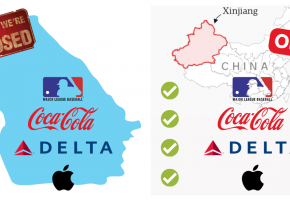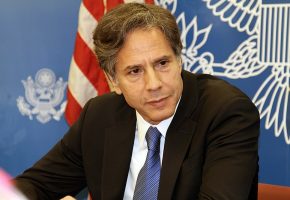The NBA Keeps Dribbling Around China’s Security State Brutality
In a softball interview with Time magazine about basketball, coronavirus and social justice, NBA commissioner Adam Silver sheepishly suggested his league’s troubled relationship with China is improving.
The interview was published the same day, June 30, the world was learning about China’s new oppressive Hong Kong “security law.” According to Time’s own coverage the measure was “more severe” than anticipated and was designed to quell pro-Democracy activism. Communist China’s hawkish state media organ, The Global Times, gloated: “anyone who organizes, plans, commits or participates in any of the acts by force or threat of force, or other unlawful means with a view to subverting state power, shall be arrested.” The propaganda outfit then noted that the first person arrested for violating the measure was detained for waving a pro-Independence flag. One freedom advocate declared the law’s passage could mark “the death of Hong Kong as we know it.”
Although the Time reporter stated social justice is a “huge issue in sports and the entire world,” the topic was avoided in a global context regarding the NBA’s relationship with China. That part of the taped talk was so delicate that the once revered outlet curiously omits any reference to the league’s relationship with Beijing in its own writeup of the conversation.
Instead of exploring China’s crackdown on freedom and how it could impact the league’s desire to do business abroad, the journalist posed Silver a sterile question about whether or not the league’s “damaged business relationship” with the Communist government “improved” since October?
Silver began his answer succinctly: “I feel it has.” He then vaguely alluded to conversations with the Xi regime and Chinese business partners before his words devolved into politically correct incoherence: “You know, we come to China with a certain set of core American values and principles. And I understand also they have a different form of government. And they have a different view on how things have been done, how things should be done. And hopefully we can find mutual respect for each other.”
As the Investigative Research Center has previously examined, the NBA is an unenviable position. The Communist nation has humiliated the league, its superstars, and sponsors on the public stage repeatedly. Beijing can do so because of financial leverage they hold over American institutions.
One topic that could have had an impact on the league’s relationship with China is the discussion surrounding allowing players to put the social justice messages on their jerseys when play resumes. The commissioner said the idea was “intriguing” during the Time exchange and it now appears the league is set to allow pre-approved slogans. Those reportedly include: “Black Lives Matter; Say Their Names; Vote; I Can’t Breathe; Justice; Peace; Equality; Freedom; Enough; Power to the People; Justice Now; Say Her Name; Sí Se Puede (Yes We Can); Liberation; See Us; Hear Us; Respect Us; Love Us; Listen; Listen to Us; Stand Up; Ally; Anti-Racist; I Am A Man; Speak Up; How Many More; Group Economics; Education Reform; and Mentor.” Such a gesture would complement the league’s decision to paint “Black Lives Matter” on basketball court sidelines.
However, it seems that no player will be allowed to take a stand against the Chinese government and its Orwellian surveillance state that relies on police brutality to crackdown on Hong Kong protesters. Hardly a surprise. Last fall, fans who conveyed support for Hong Kong protests with signs and shirts were booted from NBA arenas by security.
At the time, LeBron James lamented that people were “misinformed” about the situation. After receiving severe blowback, he claimed the league was going through a tough period and the tweet could have “waited a week” to be sent. So why not now, months later? Not taking advantage of the chance to promote global justice on jerseys seems like a missed opportunity to spread awareness. New Yorker staff writer Isaac Chotiner recently suggested a compelling idea: “Someone should come out wearing a message about Hong Kong and force Adam Silver to punish him.”
The same censorship seems ready to be applied against any player who wanted to promote justice for the Uighurs. That worthy recognition would garner tremendous support worldwide as many Uighurs are imprisoned in draconian labor camps. Females have IUDs, sterilization and abortion forced upon them in a barbaric effort to control population growth.
If there is one takeaway from Silver’s brief Time remarks relevant to China, it’s that he claims to bring a “core set” of American principles to the dynamic. What those are remain unclear.
But if actions speak louder than pabulum, it is clear the NBA has exported the popularized “silence is violence” mantra to Beijing’s benefit. After all, LeBron James did warn the league about speaking out against China in October: “We do have freedom of speech, but there can be a lot of negative that come with that too.” Adding that being vocal could lead to millionaire athletes getting harmed “financially” and “spiritually.”
Much remains to be learned about the NBA’s continued campaign to appease the Xi regime, but Time’s “100 Talks” — which bills itself as an important forum for discussion with “the world’s most influential people” — was clearly not an appropriate venue to have such a worldly conversation.



